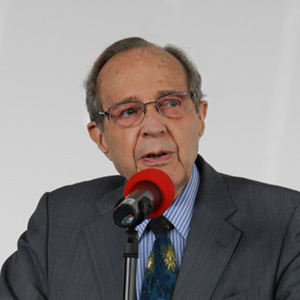

On 8 May, 2013, VCDNP hosted a public seminar by Dr. William J. Perry, a former US Secretary of Defense and one of the four distinguished US public figures (along with George Shultz, Henry Kissinger, and Sam Nunn) whose series of op-eds beginning in 2007 reinvigorated debate on the future of nuclear weapons and the path to their elimination.
In his presentation, Dr. Perry discussed the "seven lessons"—moments in his life that shaped his attitude toward nuclear weapons and led him to work toward reducing the nuclear threat and advocating their elimination; he discusses them in a forthcoming book titled "A Journey at the Nuclear Brink."
These lessons brought home the understanding of the destructive power of nuclear weapons, the futility of attempts to defend from their use, the threat of nuclear conflict through miscalculation or accident, the risk of a regional (as opposed to global) nuclear conflict, and the danger of nuclear weapons falling into the hands of terrorists. Other experiences, such as the Cooperative Threat Reduction (CTR) programs to secure and dismantle nuclear weapons and materials in the former Soviet Union, convinced him that, with political leadership, the elimination of nuclear weapons could be achieved. Out of four nightmare scenarios—global nuclear war, war through miscalculation or accident, regional nuclear war, and nuclear use by terrorists—Dr. Perry commented that only the first threat, that of a global war, has been largely removed; the other three remain and still need to be addressed by the international community.

Secretary Perry emphasized the role of education in bringing about the goal of nuclear disarmament. The public, he commented, remains poorly informed about the properties of nuclear weapons and consequences of their use. Many still treat the possibility of nuclear use too lightly. Others have ceased to pay attention; since school children are no longer required to practice "duck and cover" like they did during the Cold War, many have come to regard the nuclear threat as distant. If the public is not sufficiently informed and does not pay necessary attention to the issue, politicians do not regard this issue as sufficiently high priority either. A focused effort is needed to raise awareness and reinvigorate attention to this issue to help move it forward.

In response to a question about North Korea during the Q&A part of the event, Dr. Perry described efforts in the late 1990s to find a comprehensive solution to this problem. The policy had been developed jointly by the United States, Japan, and South Korea, and featured a package of incentives and disincentives; the former included such measures as negotiations on a peace treaty to replace the state of truce that ended the Korean War, diplomatic recognition of North Korea and exchange with ambassadors, economic assistance—particularly to help North Korea develop its agriculture—and a range of other measures. Dr. Perry traveled to North Korea in 2000 to present the package, which was received positively; this was followed by a high-level visit from North Korea to the United States. Unfortunately, the subsequent George W. Bush administration abandoned the effort, and today we witness the results: nuclear weapons and delivery systems in North Korea and the unending cycle of escalating tensions and crises.
Dr. Perry recently articulated the themes of his 8 May VCDNP presentation in an essay, "My Personal Journey at the Nuclear Brink," published 17 June by the European Leadership Network.

By continuing to use the site, you agree to the use of cookies. more information
The cookie settings on this website are set to "allow cookies" to give you the best browsing experience possible. If you continue to use this website without changing your cookie settings or you click "Accept" below then you are consenting to this.